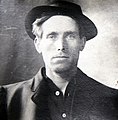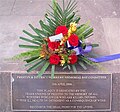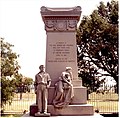Portal:Organized Labour

Introduction

- In trade unions, workers campaign for higher wages, better working conditions and fair treatment from their employers, and through the implementation of labour laws, from their governments. They do this through collective bargaining, sectoral bargaining, and when needed, strike action. In some countries, co-determination gives representatives of workers seats on the board of directors of their employers.
- Political parties representing the interests of workers campaign for labour rights, social security and the welfare state. They are usually called a labour party (in English-speaking countries), a social democratic party (in Germanic and Slavic countries), a socialist party (in Romance countries), or sometimes a workers' party.
- Though historically less prominent, the cooperative movement campaigns to replace capitalist ownership of the economy with worker cooperatives, consumer cooperatives, and other types of cooperative ownership. This is related to the concept of economic democracy.
The labour movement developed as a response to capitalism and the Industrial Revolution of the late 18th and early 19th centuries, at about the same time as socialism. The early goals of the movement were the right to unionise, the right to vote, democracy, safe working conditions and the 40-hour week. As these were achieved in many of the advanced economies of western Europe and north America in the early decades of the 20th century, the labour movement expanded to issues of welfare and social insurance, wealth distribution and income distribution, public services like health care and education, social housing and common ownership. (Full article...)
Selected article

Strike action, also called labor strike, labour strike in British English, or simply strike, is a work stoppage caused by the mass refusal of employees to work. A strike usually takes place in response to employee grievances. Strikes became common during the Industrial Revolution, when mass labor became important in factories and mines. As striking became a more common practice, governments were often pushed to act (either by private business or by union workers). When government intervention occurred, it was rarely neutral or amicable. Early strikes were often deemed unlawful conspiracies or anti-competitive cartel action and many were subject to massive legal repression by state police, federal military power, and federal courts. Many Western nations legalized striking under certain conditions in the late 19th and early 20th centuries.
Strikes are sometimes used to pressure governments to change policies. Occasionally, strikes destabilize the rule of a particular political party or ruler; in such cases, strikes are often part of a broader social movement taking the form of a campaign of civil resistance. Notable examples are the 1980 Gdańsk Shipyard and the 1981 Warning Strike led by Lech Wałęsa. These strikes were significant in the long campaign of civil resistance for political change in Poland, and were an important mobilizing effort that contributed to the fall of the Iron Curtain and the end of communist party rule in Eastern Europe. Another example is the general strike in Weimar Germany that followed the March 1920 Kapp Putsch. It was called by the Social Democratic Party (SPD) and received such broad support that it resulted in the collapse of the putsch. (Full article...)
February in Labor History
Significant dates in labour history.
- February 01 – The Paterson silk strike of 1913 began in the U.S.; the San Diego free speech fight began in the U.S. in 1912
- February 02 – Shannon J. Wall died
- February 03 – George Becker died; José Vitoriano died
- February 04 – Bill Haywood was born; John Mitchell was born; Benyoucef Benkhedda died
- February 05 – Neil Aggett died; Ludvik Buland died
- February 06 – The Seattle General Strike of 1919 began in the U.S.; Elba Esther Gordillo was born; William Hutcheson was born
- February 07 – The Cripple Creek miners' strike of 1894 began in the U.S.; the 2006 labour protests in France began; Paul Mattick died
- February 08 – Ong Teng Cheong died; Jakob Kaiser was born
- February 09 – George Lippard died; the Supreme Court of Canada issued its reasoning in Ontario Human Rights Commission v. Etobicoke
- February 10 – 11 strikers were killed during the Reesor Siding Strike of 1963 in Canada; Peter Smith died; the Building and Construction Trades Department, AFL-CIO was founded; the film Blue Collar was released
- February 11 – The Oxnard strike of 1903 began in the U.S.; the UAW won a first contract at GM, ending the Flint sit-down strike; Nellie Quander was born; Mark Hewitson died; Clyde Cameron was born; the Memphis sanitation strike began
- February 12 – John L. Lewis was born
- February 13 – The Sons of Vulcan win the first contract in the U.S. iron and steel industry and the first union contract of any kind in American history; Margaretta Scott was born; Dennis McDermott died; John Healey was born
- February 14 – The Asbestos Strike began in 1949 in Australia; the Winter of Discontent ended in the U.K. in 1979; Jimmy Hoffa was born; Michael Sacco was born; the Confederation of State and Municipal Employees of Iceland was founded; Mary Lee was born
- February 15 – The 1951 New Zealand waterfront dispute began; Baldemar Velasquez was born; Alice Henry died
- February 16 – The Griviţa Strike of 1933 began in Romania in 1933; William Quesse died; the National Hockey League cancelled its season in the middle of the 2004-05 NHL lockout; James Orange died;
- February 17 – Harry Van Arsdale, Jr. died
- February 18 – Peter J. McGuire died; George Campbell was born
- February 19 – The U.S. Supreme Court decided Garcia v. San Antonio Metropolitan Transit Authority and NLRB v. J. Weingarten, Inc.; I. C. Frimu died
- February 20 – Chittabrata Majumdar died
- February 21 – Patrick J. Campbell died; Phil Hare was born; Felix Aylmer was born
- February 22 – Albert Shanker died; David Dubinsky was born; the Democratic Organization of African Workers' Trade Union was founded; Poncke Princen died
- February 23 – Douglas Fraser died; Graduate Employees Together – University of Pennsylvania was formed; John Holman died; Kate Barnard died; Benyoucef Benkhedda was born; the Marine Engineers' Beneficial Association was founded
- February 24 – The General Union of Algerian Workers was founded; the U.S. Supreme Court decided Muller v. Oregon; John P. Frey was born; Marshall W. Mason was born
- February 25 – Edgar Nixon died; Las Aguas Bajan Turbias, an Argentine film about workers forming a trade union, debuted in the U.S.
- February 26 – John Holman was born; the Southern California supermarket strike of 2003–04 ended in the U.S.; Frederick Hayday died
- February 27 – The Labour Party was founded in the U.K. in 1909; Mark Hewitson died; the first Spanish Trade Union Organisation congress was held; the European Court of Human Rights decided ASLEF v. United Kingdom; Tom Williamson, Baron Williamson died
- February 28 – The University of Miami 2006 custodial workers' strike began in the U.S.; John White was born; Hal C. Banks was born; Lim Chin Siong was born; John La Rose died; Tommy Lewis died; Ted Theodore died; Arthur Hayday died
- February 29 – A. L. Lloyd was born
More Did you know (auto-generated)
- ... that "The Strike" (1954), about an American officer's turmoil in ordering an air strike on his own men, was rated as Rod Serling's best script he had written to date?
- ... that the murder of Luisa Lallana sparked a general strike in Rosario, Argentina?
- ... that in the 1951 court case Kuzych v White, on appeal from the British Columbia Court of Appeal, five law lords of the British Judicial Committee ruled in favour of a Communist-led trade union?
- ... that the Russian airstrike on Kyiv TV Tower (video featured) killed Yevhenii Sakun, one of at least 14 civilian journalists killed in the line of duty during the Russo-Ukrainian War?
- ... that Scottish bricklayer Brian Higgins was unable to find work for 25 years after appearing on a construction-industry blacklist?
- ... that Amazon Labor Union founder Chris Smalls was one of the leaders in the first successful effort to unionize Amazon warehouse workers in the United States?
Related Portals
Selected image
Selected Quote
History is a great teacher. Now everyone knows that the labor movement did not diminish the strength of the nation but enlarged it. By raising the living standards of millions, labor miraculously created a market for industry and lifted the whole nation to undreamed of levels of production. Those who attack labor forget these simple truths, but history remembers them."
|
— Martin Luther King Jr., Speaking to the AFL-CIO on December 11, 1961. |
Did you know
- ...that while the majority of Benin's formal workforce are represented by trade unions, nationwide use of child labour and forced labour continues?
- ...that the Bharatiya Khet Mazdoor Union, an Indian farm labourers movement, claims a membership of over 2.5 million?
- ... that the Indonesian trade union centre SOBRI decided to join the World Federation of Trade Unions following the death of Stalin in 1953?
Topics
Get involved
Also see our sister WikiProject, Housing and Tenant Rights!
Associated Wikimedia
The following Wikimedia Foundation sister projects provide more on this subject:
-
Commons
Free media repository -
Wikibooks
Free textbooks and manuals -
Wikidata
Free knowledge base -
Wikinews
Free-content news -
Wikiquote
Collection of quotations -
Wikisource
Free-content library -
Wikiversity
Free learning tools -
Wiktionary
Dictionary and thesaurus















































































